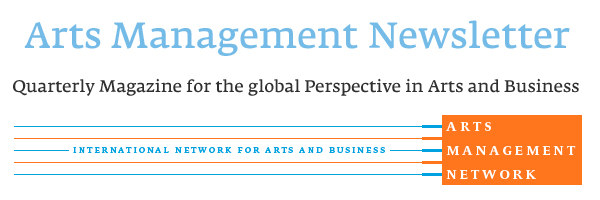Arts Management Newsletter
No 100: Africa

We have decided to focus this jubilee issue on one continent that unfortunately receives too little attention: Africa. There are not many people from Africa who read our newsletter, and of course there are many reasons for this. First of all, it is difficult to find authors and editorial contributions from this region and therefore we have been unable to offer much to the major role players in the African cultural sector. Add to this the language barrier. In many African countries, French, alongside the regional language, is spoken, and as our web resources are provided in English and German, we have been unable to cater directly to this. Another reason lies in the fact that there is simply a lack of infrastructure, both culturally and technically. There are few festivals, as well as theatrical and musical groups, which have access to the Internet. This will have to be a goal for the years to come, and in our opinion aid organizations must focus their efforts on access to education and information.
The article by our EU correspondent Ulla-Alexandra Mattl takes a closer look at cultural partnerships and initiatives that have been established between Europe and Africa, looking into the work that has been done up until now and asking how such partnerships can be best managed in the future. Can the bolstering of cultural activities, as for example in the development of cul- tural tourism, help African economies to improve?
Another central theme deals with the education and training of qualified people. Because of this, the Observatory of Cultural Policies in Africa (OCPA) was formed in 2002. In his article, Mate Kovacs, the Research Coordinator of OCPA, explains why it is so important to find and train qualified professionals in this field on the continent.
A positive example of how this goal is being implemented is seen in an arts project, devised by the Goethe Institute and InWent and realized with the help of the Institut für Kulturkonzepte Hamburg. The aim of the project is to promote the build-up of an intra-African network of arts institutions and their employees, to encourage co-operation between German and African arts institu- tions, and to develop the skills and expertise of African arts managers by of- fering seminars specially tailored to the arts sector, thereby enabling arts institutions to achieve greater professionalism. You can find a portrait of this education project on page 10.
Table of Contents
SPECIAL FOCUS - Africa
- European Cultural Cooperation with Africa (Ulla-Alexandra Mattl)
- Training in Cultural Policies and Management in Africa (Mate Kovacs)
- Advanced Training Programme for Cultural Managers in Africa
- Kinshasa Symphony
About Arts Management Quarterly
Are you interested in succeeding in the international arts sector? Then you need a comprehensive overview of new developments and the necessary know-how for their implementation. Arts Management Quarterly is an established digital journal aimed at the international audience. Not only does it reflect major developments in arts management and society beyond the national context, it also sheds light on regional developments and approaches that can be inspiring for the international arts sector.
Arts Management Quarterly can be obtained free of charge by email if you subscribe here:
In each issue, the journal focuses on a central topic from different perspectives to assess it in its entirety for the international arts sector. The journal also includes the series “Recommended Reading“ and “My working world“.
Arts Management Quarterly is published under a CC BY-NC-ND 4.0 license.
Find out how you can become an author of Arts Management Quarterly and give our readers insights into your work:
Previous issues can be downloaded in the archive:
There are no comments for this content yet.
similar content

